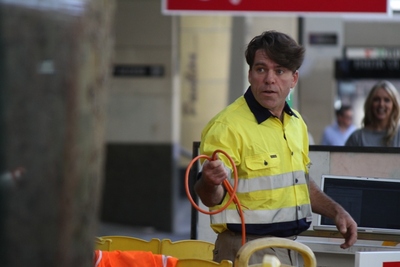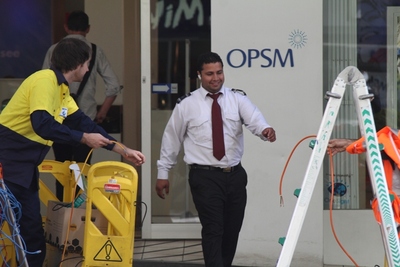WorkSafe experiment delivers shocking results
A mock worksite setup on a busy Melbourne street, in which two actors posing as workers asked passers-by to hand over a ‘live’ cable from one to the other, has delivered shocking results.
Despite being warned the cable was dangerous, a staggering 90% of people walking down Bourke Street who were asked by the ‘supervisor’ to pass the live wire to the ‘apprentice’ did as they were told. Even when the apprentice received a (fake) ‘shock’ and dropped the cable, the helpful passers-by picked it up and handed it to him again.

The experiment was conducted as part of WorkSafe Victoria’s supervisors’ campaign, to help demonstrate that people are willing to obey instructions, even if it means others may be harmed.
“Supervisors should not be asking workers to do something that is unsafe and dangerous as there is a high likelihood they will,” WorkSafe Operations General Manager Lisa Sturzenegger said.
“Supervisors need to be aware of this and ensure the people who are working for, and with, them are not put into a dangerous situation.”
The experiment was based on a series of psychological experiments conducted by Stanley Milgram in the 1960s, which highlighted people’s willingness to obey requests from authority figures, even if those requests were harmful to themselves or others.

“Victoria has Australia’s safest workplaces and its employers have, on average, the lowest premiums for workplace injury insurance, however this will only continue if high safety standards are maintained,” Sturzenegger said.
“It’s in people’s nature to be respectful and do the right thing, but at times, doing that can lead to danger.
“While employers have the principal responsibility for health and safety, supervisors also have an important role to ensure safe work practices are being followed.
“Workers’ attitudes to safety are heavily influenced by their immediate supervisor. If they don’t take safety seriously and if their employers don’t take safety seriously, the consequences can be horrific.”
WorkSafe’s campaign comes after a recent survey revealed supervisors rate keeping up with productivity and meeting client deadlines as their most important priority, ahead of safety. The survey also found one in five supervisors admitted they would ask their employees to bypass safety to complete a task quickly.
“The important thing to realise is that supervisors have roles that go beyond maintaining productivity and directing the day-to-day work,” Sturzenegger said.
“While deadlines and budgets are important, it won’t count for much if someone in the team is injured.”
The experiment forms part of a suite of activities WorkSafe is using to help target supervisors over the next month, including a television campaign which uses black humour to ask supervisors if they would do what they asked their workers to do.
- Supervisors Commercial - Warehouse/Office
- WorkSafe Supervisors TV Commercial - Manufacture and Farming
- Supervisors TV Commercial - Construction/Manufacturing
- Supervisors TV Commerical - Office
Billboards featuring mannequins working in a dangerous way have also appeared along some of Melbourne’s major freeways.
To view the video of the WorkSafe experiment, visit www.facebook.com/worksafevictoria.
Worker's death leads to first-of-its-kind Commonwealth psychosocial risks penalty
In the first penalty of its kind for a Commonwealth employer, the Department of Defence has been...
Amendments to the model WHS Act and Regulations published
Following approval by work health and safety (WHS) ministers, Safe Work Australia has published...
Victoria's new psychological injury obligations now in effect
New obligations have come into effect for workplaces across Victoria to protect employees from...








